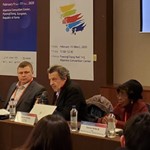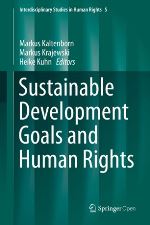Published on Wed, 2020-02-12 08:38
"Last year over 200 defenders of Human Rights and the environment were killed in Latin America. They gave their lives for their communities and for the principles that the United Nations stands for. And yet, the statistical framework for the SDGs tells us that the “partnerships” that should contribute to achieve sustainable development will be measured by the dollars they mobilized. The blood spilled by our friends and colleagues doesn't count." During a debate over the 75th anniversary of the UN, at the Pyeong Chang Peace Forum, Social Watch coordinator Roberto Bissio expressed the frustrations of civil society over the lack of meaningful interaction with the UN. |
Published on Wed, 2020-02-12 00:00
Intervention of Barbara Adams, Global Policy Forum, at the Parallel Session “UN2020” of the PyeongChang Peace Forum, Republic of Korea, February 10, 2020. |
Published on Mon, 2020-02-10 08:57
In the Philippines, the preparation of the country's VNR report 2019 catalysed a multi-stakeholder consultation process to which some CSOs, like Social Watch Philippines (SWP) were invited. SWP, in turn, convened a broader consultation process that will result both in inputs to the VNR as well as in an independent civil society report. The Philippines is currently one of the fastest growing economies of the world, with GDP hovering around 6 to 7 percent in 2018 and growing at an average of almost 5 percent a year in the last decade, but those figures coexist with a high poverty rate, a paradox situation called ‘jobless growth’. SWP comments that “there seems to be an unspoken yet dominant perspective on wealth, that as long as poverty is minimized, there should be no objection to the unbridled gains of the rich. It is assumed that wealth will trickle down to the poorest. |
Published on Mon, 2020-02-10 08:31
In the 2030 Agenda governments committed to a revitalized Global Partnership between States and declared that public finance has to play a vital role in achieving the Sustainable Development Goals (SDGs). But in recent decades, the combination of neoliberal ideology, corporate lobbying, business-friendly fiscal policies, tax avoidance and tax evasion has led to a massive weakening of the public sector and its ability to provide essential goods and services and to fulfill its human rights obligations. Public-private partnerships (PPPs) are promoted as the most efficient way to provide the necessary means for implementing the SDGs, but many studies have shown that privatization and PPPs involve disproportionate risks and costs for the public sector and can even exacerbate inequalities, decrease equitable access to essential services and jeopardize the fulfilment of human rights. An analysis by Jens Martens, from Global Policy Forum. |
Published on Fri, 2020-02-07 08:56
The formation of the new Lebanese government on 21 January 2020, nearly one hundred days after the eruption of the popular protests, is an important milestone in the first stage of the confrontation between the “revolution” and the authorities. This has raised questions and discussions among activists and groups whether the revolution has made progress, or the formation of the government constitutes a return to the bottom, to pre 17 October period. So what has the revolution achieved against the regime? Indeed, the revolution has had accomplishments on two levels, the authorities’ and popular levels. |
SUSCRIBE TO OUR NEWSLETTER







